20 Types of Pin Fasteners, Advantages and Uses
 Jan 16,2025
Jan 16,2025

In normal life, we often use components like nuts, bolts, etc. to make joints between two or more components. These joints enable us to make tough and secure structures for critical applications. These types of components, i.e., pin fasteners, come in multiple types or shapes, and this article will help you learn about them, how they are used, etc.
What Are Pin Fasteners?
You will have seen a woodworker connecting two wood sheets through a nail or a manufacturer connecting two metal sheets using a nut and bolt. These junctions which connect two or more plates or components are called pin fasteners. Let's dive into the details of these pin fasteners:
How to do Pin Fasteners Work
Their work is not so tough or complex, make holes into required components through drilling and then insert these pins into these holes. These pins cost-effectively offer easy installation of components.
Advantages of Using Pin Fasteners
You will study some important advantages of Pin Fasteners in this section:
Durability and Longevity
The pin materials include carbon steel, and stainless steel which provide high strength and wear resistance, enhancing durability and longevity.
Universality in Applications
You can find the applications of pin fasteners from construction to aerospace field making them versatile tools.
Easy to Install and Maintain
You can install these tools by just pressing into the holes of appropriate size in the parts. That's why there are user-friendly.
Cost-Effectiveness
Lower assembly and disassembly and maintenance costs make them very cost-effective connecting tools.
Safety and Adjustable Features
Pin fasteners provide very strong joints because their designs are made in this way. Their more adjustable design ensures proper safety.
20 Types of Pin Fasteners
Now, let us provide a brief description of types of pin fasteners:
Cotter Pins
Used to fix parts together lightly. The following figure shows the picture of cotter pins.
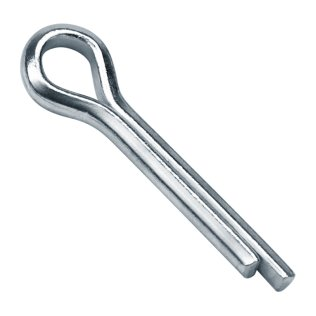
Uses and Applications
- Used to secure polymer packets, rubbers and in automobile industry.
- Easy and secure connections
Material and Durability
- Mild steel or stainless steel are the materials for these pins
- Withstand mechanical loads and resist corrosion in harsh conditions
Dowel Pins
As the figure shows, these pins come in the cylindrical shapes. You can make connections between the parts by just inserting them in the pre-drilled holes of the components.
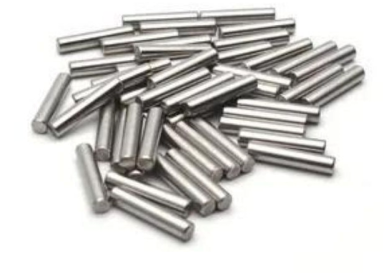
Functionality and Precision
- Precise fastening and alignment of the components
- Use these pins in furniture and machine assembly
Standard Sizes and Variations
- Available in various standard sizes
- Independent of the material
Lynch Pins
It passes through the end of an axle to keep the wheel in its original position.
Features and Locking Mechanism
- Self-locking mechanism
- Quick and secure connections
Applications in Agriculture and Construction
- You can use in securing the axles and other components in the agricultural field
- Use them in construction field for the partial connections
Spring Pins
You can use them for the firm connections of the multiple components by just pressing pin into the holes.
Design and Flexibility
- Elastic fasteners
- Expand and place firmly on the components
Types of Spring Pins (Slotted vs. Coil)
For the hard materials and steel parts, use slotted pins
Coil pin fasteners: More flexible and can absorb shocks and vibrations
Wire Lock Pins
As the figure shows, the wire over a pin is used to lock the components.
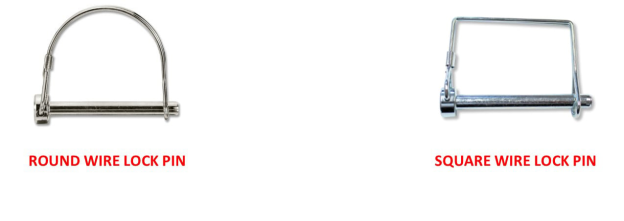
How They Work
Just tight the wire over the pin to lock a part etc.
Key Benefits for High-Security Applications
- Eliminate cotter pin loss
- Reliable choice in critical scenarios
Taper Pins
To make connections in rotating components, you can use taper pins.
Tapered Design and Functionality
The tapered design supports its functionality i.e. effective locking and precise alignment.
Common Uses in Machinery
- In the wheels of tractors, cars, etc.
- To manage repeated assembly and disassembly
L-Handle Pins
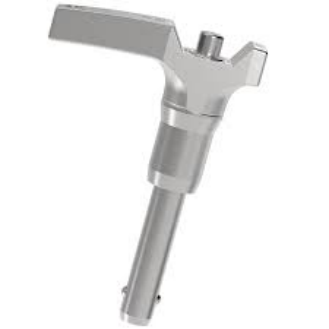
An L-shaped handle in this type of pin fastener provides an easy grip.
Overview and Features
The L-shaped'pin fastener is equipped with features like quick locking and adjustment.
Common Industries and Uses
- Agricultural industry
- Used in handling setups
Clevis Pins
These pins are non-threaded and reusable and used for the same purposes i.e. firm connections.
Features and Applications
- Makes connections between the moving parts
- Used in the agriculture field commonly
Importance in Safety and Rigidity
Robust fastening causes enhanced safety and rigidity.
Detent Pins
- Also known as quick-release pins
- The purpose is making connections
Mechanism and Locking Process
- Insert the pin into the desired application hole
- Push for the lock
- Pull the pin to unlock it
Common Applications in Industrial Equipment
- Outdoor and mobile equipment
- Construction machinery
- Marine applications
Hitch Pins
To secure equipment or attachments to a towing vehicle, through a hitch receiver or hole in a coupler, you should use these pins.
Features and Variations
Known as heavy-duty fasteners, tow trailer and towing vehicles.
Common Uses in Vehicles and Machinery
- Connections between a trailer and a vehicle
- Reclining furniture
- Agricultural equipment
- Lawn equipment
Groove Pins
The locking mechanism is to press the fastener into an appropriate-sized hole. These are non-threaded and press fit.
Applications in Precision Engineering
- Locking devices
- Pivots
- Bearings
- Locating elements in assemblies
Advantages over Other Pin Types
- Enhanced grip and stability
- Stronger lock that resists loosening due to vibrations
Snap Pins
- No additional tools are required, they just snap into place
- U-shaped pin fasteners, work like snap pins and are famous for their ease of use
Quick and Easy Installation
User-friendly pins are famous for their quick and easy installation.
Key Applications in Quick Release Systems
Outdoor equipment and machinery, because in these fields quick release is required.
Bent Pins
This pin fastener contains a 90-degree angle bent at one end; the name also gives the idea.
Unique Design and Advantages
The design of this kind of pins has a 90o bend, which makes them unique. This uniqueness enables us to install and handle them easily.
Industries Where Bent Pins Are Essential
- Mainly used for extra fixing
- Automotive and towing
- Agricultural equipment (ploughs, harrows)
- Marine industry
- Aerospace
Push Pins
Push pin means that its one end is very sharp and inserted into the surface. The other end contains a head making pushing this pin easier.
Quick and Easy Fixing for Light Materials
These pins work best for light materials, you can often see them in the office.
Common Uses in Office and Home Applications
Used to push the papers on the notice boards
Expanding Pins
These pins contain two fingers, when actuated, the fingers expand to the centre and locate the part.
Expanding Design for Secure Fixation
Offer adjustable fastenings, which ultimately provide secure connections.
Applications Requiring Strong Locking Force
- Automotive industry (gear assemblies)
- Structural components in the aerospace field
Clinch Pins
These pins have a hump on one end that does not require bending of the ends. Just press these pins to install them into the components etc.
Compression Mechanism for Secure Attachment
Press through the hump for secure attachment.
Use in Assembly and Structural Applications
Various mechanical systems use this kind of pin fastener.
Tension Pins
Unique design of the pins, able to resist the tension forces while connecting two or more components.
Designed to Withstand Tension Forces
The following figure shows the pin's design due to which it resists tension.
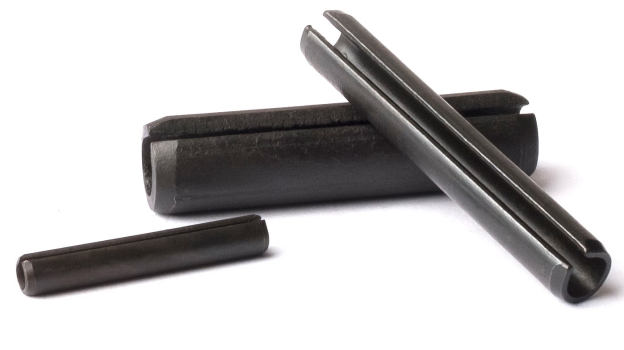
Common Uses in High-Tension Environments
- Axle and wheel assemblies in an automobile
- Flight control mechanisms
- Railcar coupling systems
Floating Pins
It is allowed to shift within its hole during use which is why it does not lock the components permanently.
Flexible Design for Adjustable Positioning
A different design is used to adjust misalignments.
Applications Requiring Movement or Alignment Adjustment
- Used in flexible applications
- Steering linkages
Retaining Pins
Its design is like a design of spring which helps it in sticking to its position firmly once it is fitted.
Used to Secure Components in Place
It Provides operational reliability.
Common in Machinery and Automotive Assemblies
- Used to secure bearings, gears and shafts
- Piston pins
- Linkages and arms in industrial machinery
Safety Pins
- Spring-like working mechanism
- Easy to handle
- Locks only covered area
Secure and Safe Fastening for Textiles and Fabrics
Use these pins for softer materials like fabrics.
Popular in the Garment and Craft Industries
The lower strength of the pins makes them usable in the garment and craft industries.
Common Materials Used in Making Pin Fasteners
These are the materials which are used for making pin fasteners:
Steel (Carbon Steel, Stainless Steel)
Steel due to its higher strength and corrosion resistance
Aluminum and Other Lightweight Materials
Al is a good choice in the aerospace industry due to its lightweight, conductivity and corrosion resistance.
Brass and Bronze for Corrosion Resistance
For make an appearance aesthetic and corrosion-resistant, use brass and bronze.
How Pin Fasteners Are Made
That is how a pin fastener is made:
CNC Machining for Precision
To produce pin fasteners of 100% okay dimensions, a fully advanced machine is required and that is a CNC machine.
Stamping and Die-Cutting
Use the stamping process and then die-cutting after selecting the appropriate material.
Forging for High-Strength Applications
To get higher strength, forging is an essential manufacturing process.
How to Select the Right Pin for Your Project
Earlier we discussed the various shapes of the pins. Now let us discuss how to choose the right pin:
Consider the Material Requirements
High strength is required? use a pin of steel material.
Size and Shape Selection
First measure the size of the hole or the thickness of the material, then select the respective shape of the pin.
Load Capacity and Strength Considerations
It is an important factor to prevent failure during the applications.
Environmental Resistance (Corrosion, Temperature, etc.)
Environmental factors are important to consider because ultimately, they cause failures.
Common Applications of Pin Fasteners
Let's have a look at the applications:
Automotive Industry
The pins are used for secure connections of components during the manufacturing process.
Pin Fasteners in Vehicle Assembly
For reliable connections in:
- Vehicle body assembly
- Engines
- Suspension systems
Pin Fasteners in Suspension Systems
Safe and effective operation of suspension systems in vehicles due to pin fasteners.
Medical Industry
The pins are used in the medical industry to:
- Save the material's integrity
- Enhance safety.
Use of Pins in Medical Devices
For secured assembling of:
- Surgical Instruments
- Medical Machinery
Safety and Precision in Medical Applications
These pins provide precise alignment which results in enhanced safety and precision.
Industrial and Machinery Applications
Reliable and robust fastening make pin fasteners usable for industrial and machinery applications.
Pins in Equipment Assembly
- For fastening the components in:
- Engines
- Pumps
- Manufacturing machines
Pins for Quick Assembly and Disassembly
Quick assembly and disassembly result in minimal downtime during repairs.
Partner with Tuofa for Custom Pin Fasteners
We will tell you why you should choose Toufa for custom pin fasteners:
Why Choose Tuofa?
You should come to Toufa for your orders because:
- Exact CNC machines which are helpful in metal pins as well
- Low manufacturing process costs
- Within-time delivery
Expertise in CNC Machining
Toufa stands with the best CNC operators who ensure tight tolerance while making metal pins.
Custom Solutions for Every Industry
Toufa company will make customized pins for you with great efficiency for the respective applications.
Conclusion
Pin fasteners connect two or more components firmly for temporary or permanent times. These tools or components come in more than 20 shapes which have their applications. These pins are easy to carry, handle and install and provide the advantages like replaceable parts. Many factors like the load should be considered before choosing a pin fastener.
Frequently Asked Questions (FAQ)
What is the difference between a hitchpin and a lynchpin?
To connect a vehicle with a trailer: Use hitch pins
For locking components temporarily: use lynch pins
What are the advantages of using pin fasteners over other types of fasteners?
The main advantages are:
- Easy installation
- Versatility in designs and strengths
What are the most common challenges when using pin fasteners?
The most common challenges include:
- Finding the appropriate size
- Selecting the shape of the pin
Can pins be customised for specific industrial applications?
Equipped with the most advanced tools CNC machines can customise the pins easily.
How do I know which type of pin is best for my project?
Type of application, size and loading are the important factors when selecting a pin fastener.
 Tel/WeChat:
Tel/WeChat:  Email:
Email: 
 Home
Home
 Difference Between CAD and CAM: Definition and Benefits
Difference Between CAD and CAM: Definition and Benefits 







